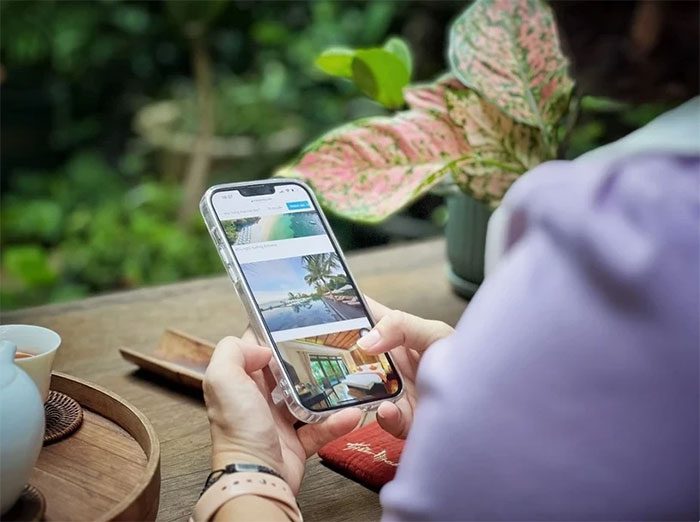Skincare products are said to protect you from blue light. But is this really true?
The use of mobile phones and electronic devices has led many people, especially women, to worry about the harmful effects of blue light on their skin.
Many sources claim that blue light has become a foe of women’s skin in recent years. Consequently, skincare products have been developed to combat these factors.
But are these products truly effective, or are they merely marketing strategies aimed at driving sales? Let’s examine the following aspects:
What is Blue Light?

Blue light can lead to premature aging. (Illustration: Mai Mai/Vietnam+)
Ultraviolet (UV) rays primarily come from sunlight, with wavelengths ranging from 280 to 400 nanometers. Blue light emitted from mobile phones and electronic devices also falls within the electromagnetic spectrum.
The key difference is that blue light is visible, with a wavelength range of 450 to 495 nanometers, while UV rays are invisible.
Dr. Connie Yang, a cosmetic dermatologist, states: “The sun is the main source of blue light. However, screens from phones, TVs, and computers also generate blue light.”
How Can Blue Light Affect the Skin?
Dr. David Kim, a dermatologist, notes: “Recent studies indicate that visible light (ranging from 400 to 700 nanometers) can increase pigmentation in the skin.”
“There is evidence that blue-violet light (wavelength 415 nanometers) increases skin pigmentation more than red light (630 nanometers). Another study has shown that blue light causes redness and pigmentation in Fitzpatrick skin types 3 and above,” Dr. Kim adds.
Dr. Hamdan Abdullah Hamed, a dermatologist, asserts that blue light can lead to premature aging: “It generates reactive oxygen species, causing oxidative processes that result in premature aging, with wrinkles and uneven pigmentation appearing.”
However, he also “reveals” that blue light has some positive applications, mainly in treating skin conditions such as acne and pre-cancerous cells through oxidation.
According to The Zoe Report, the blue light emitted from mobile devices is similar to the blue light emitted from LED masks (commonly used for acne treatment). Blue light is also used to treat eczema and psoriasis.
Do We Really Need to Protect Our Skin from Electronic Devices?
Experts agree that protecting the skin from electronic devices is essential.
“If you frequently sit in front of a computer screen, skincare is very important. You might consider investing in blue light-blocking glasses to protect your eyes from damage,” advises Dr. Hamed.
Is SPF Sunscreen Sufficient Against Blue Light?
Dr. Kim believes that UV filters in sunscreen mainly provide protection against UVA/UVB rays. However, these filters are ineffective against blue light.
Ingredients That Protect Against Blue Light
According to experts, if you decide to use products that protect against blue light, you should look for certain specific ingredients:
Antioxidants: Look for ingredients containing Vitamin C and E, green tea extract, and blueberries, all of which have high polyphenol content (plant compounds with antioxidant properties).
Niacinamide (Vitamin B3): “This ingredient can help reduce stress and damage caused by blue light, especially when combined with polyphenols,” Dr. Kim explains.
Liquorice Extract (Licochalcone A): According to Dr. Kim, this component from liquorice extract has been shown to counteract blue light.
Iron Oxides: Commonly used in mineral sunscreens for coloring, these have been proven to provide protection against blue light, especially when paired with zinc and titanium dioxide.



















































